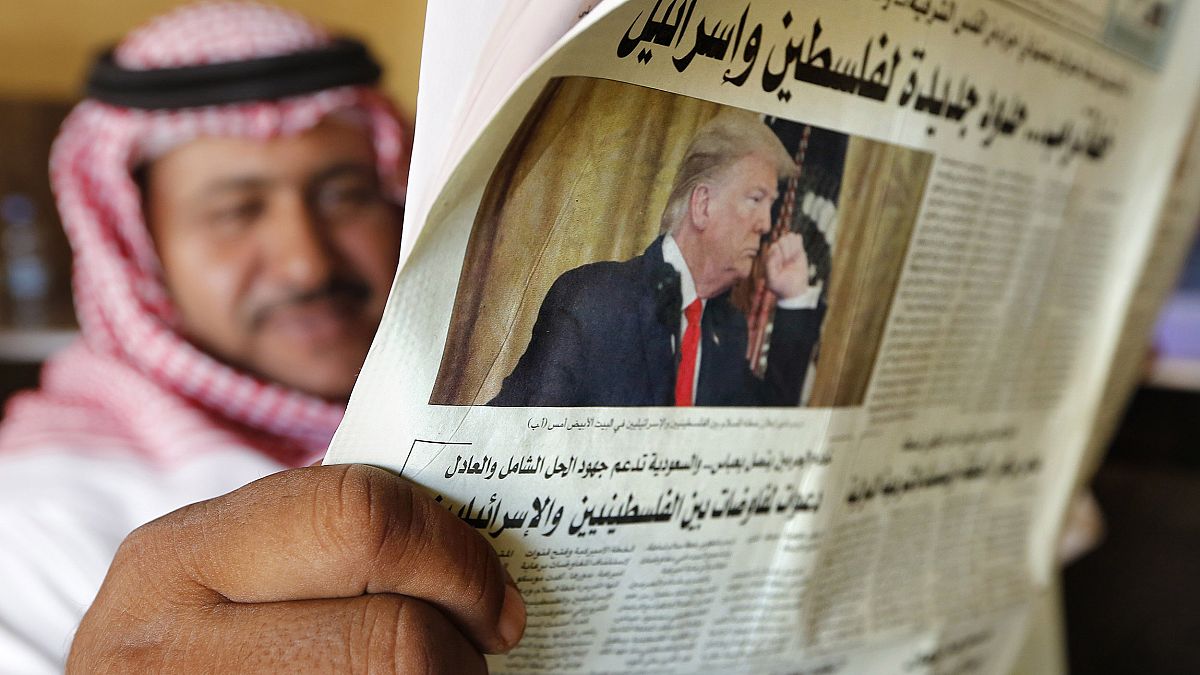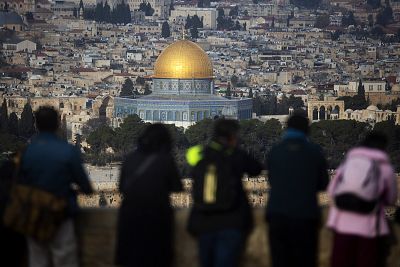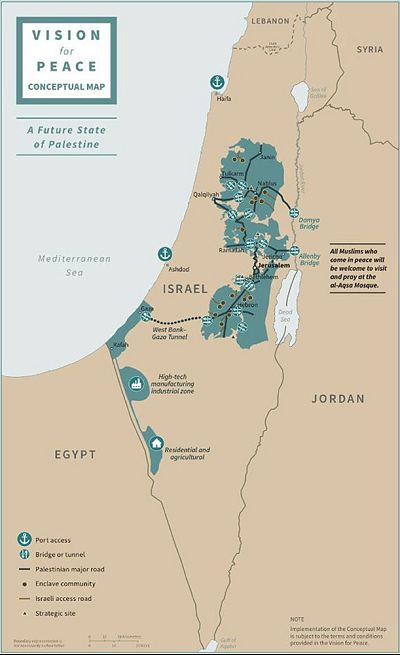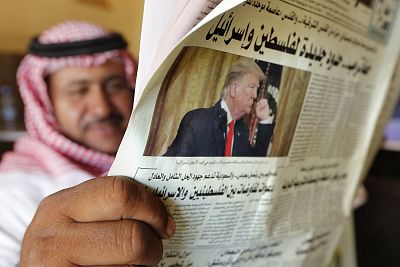"I would not be surprised if we see a resurgence of armed struggle against Israeli settlements which will escalate into violent clashes," said an analyst.
The Trump administration's Mideast peace plan will not end the decades-old conflict but could actually extend it, Israel watchers and Palestinians warn.
"Is it going to lead to an agreement with the Palestinians? Categorically not," said Yossi Mekelberg, a professor of international relations at Regent's University in London. "In fact, it will harden their position."
Palestinian leaders lost no time in rejecting the plan, which was presented by President Donald Trump in Washington on Tuesday with Israeli Prime Minister Benjamin Netanyahu by his side.
"Jerusalem is not for sale," said President Mahmoud Abbas, speaking thousands of miles away in the Palestinian administrative center of Ramallah on the West Bank. "We say one thousand times: no, no, no, to the deal of the century."
Longtime Israel observers and human rights activists have described the plan as skewed toward Israel, upholding its red lines on almost all of the most contentious issues in the decades long conflict, while granting the Palestinians a disjointed and patchy state.
The proposed map of a future Palestine would rely on "an innovative network of roads, bridges and tunnels" to enable the freedom of movement of Palestinians, according to the plan.
But Mustafa Al-Barghouti, secretary general of the Palestinian National Initiative Movement, which advocates nonviolent resistance to the Israeli occupation, compared the patchy territory to Bantustan, a territory for indigenous African peoples of apartheid-era South Africa.
"Trump's ghettos are worse," he said.
The proposal, spearheaded by Trump's son-in law and senior adviser Jared Kushner, leaves most of the annexed parts of east Jerusalem, including the Old City and the holy sites, under Israeli control, while allowing the Palestinians to establish a capital in the outskirts of the city beyond Israel's separation barrier.
Meanwhile, the plan allows Israel to extend its sovereignty to the vast majority of its settlements in the occupied West Bank, which it captured from Jordan in 1967 in the Six-Day War. The settlements are viewed as illegal by most of the international community.
If it goes ahead with the annexation, Israel will exercise sovereignty over approximately 30 percent of the West Bank, according to the U.S. ambassador to Israel, David Friedman. Today, the West Bank is home to some 2.6 million Palestinians and more than 400,000 Israelis, according to anti-settlement group Peace Now, and the area has long served as the center of Palestinian hopes for an independent state.
"The Palestinians will resist," said Fawaz Gerges, a professor of international relations at the London School of Economics and Political Science.
"I would not be surprised if we see a resurgence of armed struggle against Israeli settlements which will escalate into violent clashes," he added.
Palestinians began protesting in the West Bank's Jordan Valley on Wednesday — an area that runs along the easternmost side of the territory near the border with Jordan that is earmarked in the plan for Israeli annexation.
"We will not accept the deal at all and today's demonstrations will be a beginning for continued daily resistance," said Jamal Juma, the coordinator of the Palestinian Grassroots Anti-Apartheid Wall Campaign, which aims to tear down Israel's separation wall.
The plan "legitimizes Israel's ongoing settler-colonial practices that aim at annexing large and strategic parts of the West Bank," he added.
The U.S. has said Israel can annex its settlements immediately and Israeli officials have indicated that Netanyahu will try to bring it to a vote as soon as possible.
Israeli Defense Minister Naftali Bennett announced Wednesday that he was establishing a team to implement the annexation of the settlements, and called on the government to move swiftly to extend sovereignty to the areas ahead of the March 2 election.
"This is the biggest political opportunity that has come our way in 50 years, but an opportunity can pass if not grasped and implemented," he said in a statement.
However, it was not immediately clear whether Israel's caretaker government would have the authority to implement the plan. The Israeli Democracy Institute said Wednesday that "in theory" it was possible for the government to annex territories but that it is unlikely to be approved by the Supreme Court.
If Israel manages to annex parts of the West Bank, it would only make it more difficult for land swaps and a negotiated settlement to be reached between Palestinians and Israelis in the future, analysts said.
"The more you create unilateral facts on the ground, the more difficult it becomes," Mekelberg said.
Meanwhile, Palestinian officials have four years to decide whether to accept the deal that is, according to Friedman, contingent on a "complete dismantling of Hamas, Islamic Jihad, other terrorist groups" in Gaza.
At this stage, it looks unlikely that the Palestinians will agree.
"This will not pass," veteran Palestinian politician Hanan Ashwari said in reaction to the deal.
It's a plan that "flouts international law, that violates the rights of a whole nation and that seeks to perpetuate the conflict and generate extremism and violence," she said in a video message.
"It wreaks havoc not just in Palestine and Israel but throughout the world and seeks to challenge and destroy the rules-based system."
And it is not only Palestinians who oppose the deal. Even some right-wing Israelis were critical of the plan.
A delegation of the Yesha Council, an umbrella group of Israeli settlement leaders in the West Bank that traveled to Washington for the plan's unveiling, said Tuesday that it was "very disturbed."
"We cannot agree to a plan that would include the establishment of a Palestinian state that would pose a threat to the state of Israel," David Alhaini, the group's chairman, said.
Mekelberg said the annexation of occupied land by Israel should worry the international community and stressed that the deal was not good for regional stability.
Jordan, Israel's neighbor to the east, rejected the plan Tuesday, describing the proposed annexation of Palestinian land as "dangerous" and in contravention of international law.
"Jordan condemns such measures as a violation of international law and provocative actions that will push the area towards more conflict and tensions," Foreign Minister Ayman Safadi said in a statement.
Egypt issued a carefully worded statement thanking the U.S.for its efforts but reaffirming that there should be talks between the two sides.
And Saudi Arabia said in a statement Tuesday that King Salman had telephoned Abbas to confirm the kingdom's committment to the Palestinian cause and continued support for the "brotherly Palestinian people."
Mekelberg said the deal puts Gulf states in a difficult position because they need Trump's support in countering their arch-foe Iran, but their Arab populations are committed to the Palestinian cause.
"They're holding a grenade right now," he said. "Putting the rest of the region in this difficult situation when there are heightened tensions with Iran, it's just not smart."



